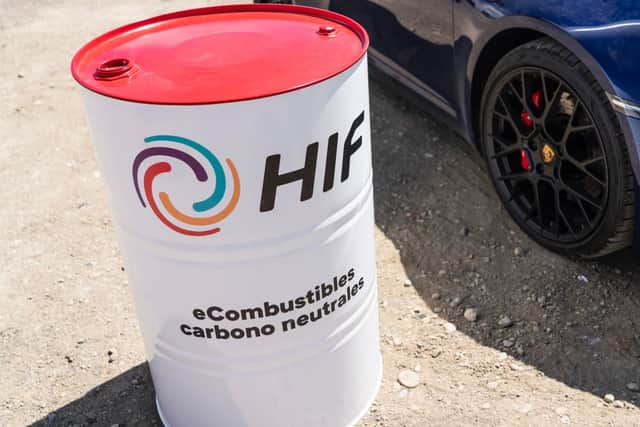EU could allow e-fuel cars to remain on sale after 2035 petrol and diesel ban
and live on Freeview channel 276
Car makers in Europe could get around a ban on combustion-engined cars by using e-fuels under new proposals reportedly being considered by the European Commission.
The European Union intends to ban all internal combustion engine (ICE) cars and light vans by 2035 but according to leaked documents seen by the Reuters news agency, legislation could create a new category of vehicle to cover cars which run on carbon-neutral synthetic fuels.
Advertisement
Hide AdAdvertisement
Hide AdThis would allow car makers, who are scrambling to develop all-electric line-ups, to continue producing and selling ICE models beyond the planned ban on the sale of CO2-emitting cars.
E-fuels are created using captured CO2 and hydrogen and carbon-neutral electricity. The fuels themselves still create CO2 emissions but these, in theory, are equal to or less than the carbon taken out of the atmosphere in their production.
The EU agreed in February to set the 2035 date for ending the sale of ICE cars but Germany lodged last-minute objections and called for the use of e-fuels beyond 2035. The new proposals are believed to be in response to this.
The Commission declined to comment on the reported documents, but told Reuters that any solution must comply with the 2035 phase-out law. A spokesperson told the news agency: “The talks are ongoing between the Commission and the German authorities.” An EU official also said that any proposal on e-fuel cars would not be considered until after laws on phasing out ICE cars were adopted.
Advertisement
Hide AdAdvertisement
Hide AdThe UK also plans to ban the sale of all ICE vehicles by 2035. Purely petrol and diesel cars will be outlawed from 2030 while hybrids which can travel significant distances in EV mode will be allowed until 2035.
Hugo Griffiths, consumer editor at carwow says the partial U-turn was “inevitable” and called on the UK government to consider similar action. He said: “The question now must be when, not if, the UK will echo these changes. While electric cars are in many ways superior to petrol and diesel vehicles, consumers have legitimate concerns over affordability, charging infrastructure, supply chains and electricity-generation capacities.”


The Department for Transport said it was not looking at any similar measures as e-fuels still produce CO2 emissions from vehicles. A DfT spokesperson told NationalWorld: “We remain committed to phasing out the sale of new petrol and diesel cars and vans by 2030, with all new cars and vans being zero emission at the tailpipe by 2035”.
What are e-fuels?
E-fuels, such as e-kerosene, are lab-developed fuels created through the complex synthesisation of captured CO2 and hydrogen, rather through refining crude oil.
Advertisement
Hide AdAdvertisement
Hide AdTheir supporters argue that because they can be stored, transported and delivered in the same way as traditional fuels and can be used in existing ICE vehicles they could be a means to cut transport emissions without replacing every vehicle on the road. They also argue that they are better suited to heavy use in freight vehicles, aviation and maritime settings.
However, opponents argue that the process of synthesising the fuels is complicated, expensive and energy-intensive and currently nowhere near the scale needed to serve the mass market. According to a 2021 report in the Nature Climate Change journal, using e-fuels requires about five times more renewable electricity than running a EV.
Major oil and gas companies are investing in e-fuels and some car makers, including Porsche and BMW have stakes in e-fuel companies. However, many more are focused on battery electric vehicles and early this month Volkswagen boss Thomas Schäfer said the arguments between Germany and the EU were “unnecessary noise” distracting from the shift to EVs. And Volvo, and Ford, both of whom plan to shift entirely to electric passenger cars by 2030, have urged the EU not to backtrack on the 2035 ICE ban.
Alongside synthetic fuels, Toyota is experimenting with using hydrogen as a combustion fuel rather than as a means to power fuel cell vehicles. It has already compete in endurance touring car racing in Japan using a hydrogen combustion GR Corolla and is developing hydrogen-powered Hiluxes at its Derbyshire factory.
Comment Guidelines
National World encourages reader discussion on our stories. User feedback, insights and back-and-forth exchanges add a rich layer of context to reporting. Please review our Community Guidelines before commenting.
